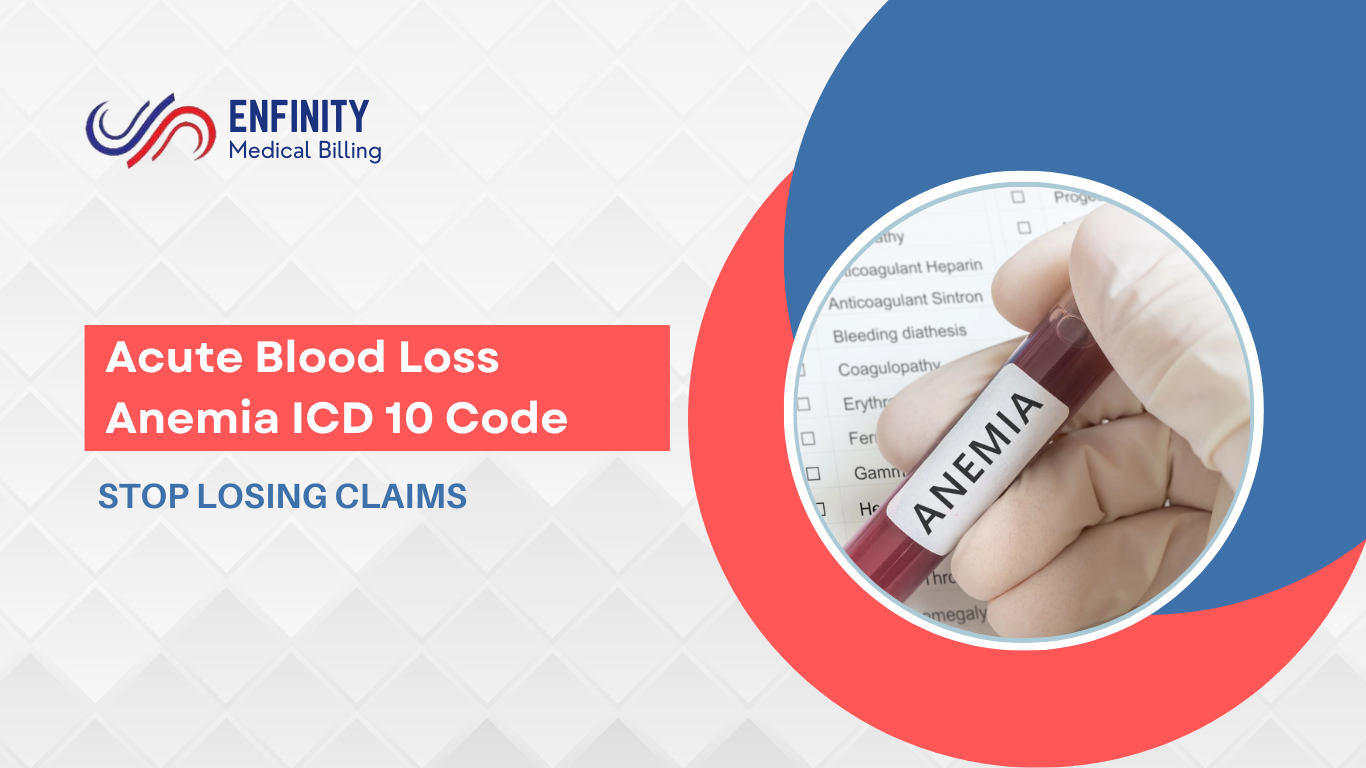In the ICD 10 coding system Acute blood loss anemia ICD 10 code D62 refers to specific code used to classify anemia caused by significant blood loss, such as after surgery or injury Acute blood loss anemia is a condition in which there is significant reduction in the number of red blood cells or hemoglobin due to rapid loss of blood. This condition often results from trauma, surgery or internal bleeding. Proper diagnosis and accurate ICD 10 coding for anemia are critical to ensuring that the condition is treated effectively and that healthcare providers are reimbursed correctly.
ICD 10 code system is essential for categorizing and documenting various medical conditions, including acute blood loss anemia. In this guide, we will explore acute blood loss anemia ICD 10 code D62 and the guidelines for accurate coding.
What is Acute Blood Loss Anemia?
Acute blood loss anemia occurs when significant amount of blood is lost quickly, leading to a drop in red blood cells and decrease in the blood’s ability to carry oxygen. Common causes of acute blood loss anemia include:
- Trauma or injury
- Surgical procedures
- Gastrointestinal bleeding
This type of anemia can be life threatening and requires immediate medical intervention to prevent complications. Understand how revenue cycle management affects your practice’s bottom line and how efficient coding can streamline your processes.
ICD 10 Code for Acute Blood Loss Anemia
ICD 10 code used for acute blood loss anemia is D62. This code is used when patient experiences sudden loss of blood, whether due to trauma, surgery or other medical conditions. Understanding and correctly applying D62 code is essential for accurate documentation and billing.
ICD 10 Code for Other Types of Anemia
There are various types of anemia, each requiring specific ICD 10 codes. Here’s a list of common ICD 10 codes for anemia:
- D50.0: Iron deficiency anemia due to blood loss
- D62: Acute blood loss anemia
- D64.9: Anemia, unspecified
- D53.9: Nutritional anemia, unspecified
These codes help ensure that healthcare providers can properly document anemia and its underlying causes for treatment and billing purposes.
Coding Guidelines For Acute Blood Loss Anemia ICD 10
Accurate ICD 10 coding is crucial for proper treatment of anemia. Guidelines provide coders with instructions on how to assign correct code based on the type and cause of anemia. Key points to consider include:
- Combination Codes: When anemia is caused by another condition (e.g., blood loss from surgery), Combination code should be used to reflect both the anemia and the underlying condition.
- Exclusion Codes: These are used when certain conditions are ruled out as cause of anemia, preventing coder from selecting an incorrect code.
Common Coding Challenges in Anemia
Anemia coding can present challenges due to the variety of causes and types. Some of the most common challenges include:
- Differentiating Between Types: Anemia can result from blood loss, nutritional deficiencies or chronic diseases, requiring careful differentiation to assign correct ICD 10 codes for anemia.
- Incomplete Documentation: Insufficient details in medical records can make it difficult to determine exact cause of anemia, leading to inaccurate coding.
- Multiple Types of Anemia: In some cases, patients may have more than one type of anemia, which requires coders to prioritize and select most relevant code.
To avoid these challenges, coders must follow ICD-10 guidelines and ensure thorough documentation of patient conditions. Boost your revenue cycle management by ensuring accurate Medical Coding and billing practices that lead to better reimbursements and fewer claim rejections.
Importance of Accurate ICD-10 Coding for Acute Blood Loss Anemia
Accurate ICD 10 code for acute blood loss anemia is crucial for several reasons:
Impact on Diagnosis and Treatment
Correct coding ensures that healthcare providers can offer most appropriate treatment. For example, if a patient has acute blood loss anemia, Healthcare team will focus on addressing immediate cause of blood loss, such as performing surgery or treating gastrointestinal bleeding.
Reimbursement and Billing
Accurate coding ensures that healthcare providers are reimbursed correctly by insurance companies. Incorrect coding can lead to claim rejections, delays in payment or reduced reimbursement.
Consequences of Incorrect Coding
Incorrect ICD 10 codes for anemia can result in misdiagnosis, improper treatment and financial setbacks. Healthcare providers must ensure that codes are used correctly to avoid these issues.
Best Practices for Accurate Anemia Coding
To improve accuracy and avoid common mistakes in anemia coding, healthcare providers and coders should follow these best practices:
- Thorough Documentation: Ensure that medical records contain all relevant information, including cause of anemia, test results and any underlying conditions.
- Stay Up to Date: ICD-10 code system is periodically updated. Coders must stay informed about any changes to ensure they are using the most accurate and current codes.
- Use Reliable Coding Tools: Leverage coding software or tools to help identify correct codes based on patient records.
Case Studies of Correct and Incorrect Anemia Coding
Understanding real world examples can help highlight the importance of accurate coding. Here’s a case study that demonstrates the difference between correct and incorrect anemia coding:
Case Study: Correct Coding
Patient experiences acute blood loss due to car accident and is diagnosed with acute blood loss anemia. Correct ICD-10 code D62 is assigned, reflecting both the type of anemia and its cause. Patient receives appropriate treatment and healthcare provider is reimbursed for their services.
Case Study: Incorrect Coding
In same case, if wrong code, such as D50.9 (iron deficiency anemia), is used, it would misrepresent condition and lead to delays in treatment or reimbursement issues. Proper documentation and accurate coding are essential to prevent these mistakes.
About Enfinity Medical Billing
At Enfinity Medical Billing, we specialize in providing accurate and efficient coding and billing services to healthcare providers. Our team of experts ensures that all diagnoses, including anemia, are accurately documented and coded, maximizing reimbursement and ensuring compliance with industry standards.
We offer comprehensive range of services, including:
- Medical Coding
- Revenue Cycle Management
- Claims Submission
- Audit and Compliance Services
Conclusion
Accurate ICD 10 coding for acute blood loss anemia is essential for proper diagnosis, treatment and reimbursement. D62 code should be used for acute blood loss anemia, while other codes may be used for different types of anemia. By following ICD 10 coding guidelines and best practices, healthcare providers can improve patient care, avoid coding errors and ensure timely reimbursement.
For expert medical billing and coding services, Enfinity Medical Billing is here to help.
FAQs
What is the ICD-10 code for other Iron deficiency anemia?
ICD-10 code for other iron deficiency anemia is D50.9. This code is used when the specific cause of iron deficiency anemia is not specified.
What is the ICD-10 code for acute blood loss anemia?
ICD-10 code for acute blood loss anemia is D62. This code is used when there is a sudden loss of blood leading to a decrease in red blood cells and hemoglobin.
What is the ICD 11 code for anemia?
ICD-11 code for anemia depends on the type of anemia. For general anemia, the code is DB50.
What is the ICD-9 code for Anaemia?
ICD-9 code for anemia is 280.9. However, ICD-9 codes have been replaced by ICD-10 codes in most countries, including the United States, since October 2015.
What is the difference between ICD-10 and ICD-11?
ICD-10 is the 10th revision of the International Classification of Diseases, and it has been in use since 1999. The ICD-11 is the latest revision, introduced in 2018 and effective in 2022. ICD-11 features more detailed classifications, improved structure for digital health systems, and additional coding for diseases and conditions not covered in ICD-10.






